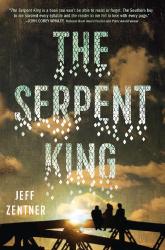Review
The Serpent King
- Jeff Zentner
- Tundra Books, 2016

First-time author Jeff Zentner’s YA novel The Serpent King follows Dill and his friends Travis and Lydia through their final year of high school and explores their struggles to break free of heredity and inheritance. It’s a typical problem novel, and this trio faces a pile of problems indeed. But of course, because the book is intended for “children”, it must somehow end happily.
Dill is the central character. Dill and Travis have hard lives, while Lydia’s is privileged, apart from the “hardship” of growing up in a small Southern town. Numerous forces — such as poverty, abusive fathers, school bullying, small-minded religiosity, and a general nastiness — may keep the friends from achieving their dreams. The plot, told in their alternating voices, describes what happens and how it affects them.
I read A LOT of YA books and understand why many adults dislike the genre. Problem fiction always risks overdoing the drama; mishandled, problem novels turn into miserablism for teens. That’s how this novel reads. Every plot point feels heavy and overdetermined — but perhaps that’s what a reader should expect when the novelist sets his story in a town named after a founder of the Ku Klux Klan. (The author’s comments suggest that he based the book on his own experiences of growing up in the American South.)
Novels like this often receive heaps of praise for being sensitive, gritty, and realistic, and certainly this novel is realistic. Many teens do struggle with serious problems, and the political and social fracturing of communities — particularly between urban and small-town rural and between haves and have-nots — amplifies the already significant challenge of growing up. But writing about individuals’ problems does not necessarily make a great book. Perhaps for people who don’t read much YA literature, this book feels fresh and aware because of the ground it covers; for anyone immersed in the genre, however, it feels overburdened with types and tropes (not to mention a heavy-handed attempt to update the character of Atticus Finch in the form of Lydia’s dad). The dread-filled atmosphere was so thoroughgoing and unrelieved that I found the book a challenge to grind through. And the conclusion, when everything is set as right as it can be, was far too long. I stopped caring about the characters and their futures — that’s not a good sign for any book.
If you’re a straight white Christian boy growing up in a small Southern town, The Serpent King confirms that “it gets better” when you grow up and leave. Such a conclusion frankly makes me wonder what small-town America will be in another decade — but perhaps current US politics already tells *that* story.
The Serpent King is a fine book, but just that: fine. I am not the audience for this novel and didn’t care for it.
This review was originally published in Resource Links on May 22, 2016.
